
- About Michelle Waters
- Curriculum Vitae
- Tools I Use
- Podcast Episodes
- How To Be Our Podcast Guest
- Member Login
- Member Helpdesk
- Support Portal
- Resource Partners
- Writing Partners
- Certificate Verification
- How To Contribute
by Michelle Boyd Waters, M.Ed.

Essays Every High School Student Should Read
December 4, 2016 in Pedagogy
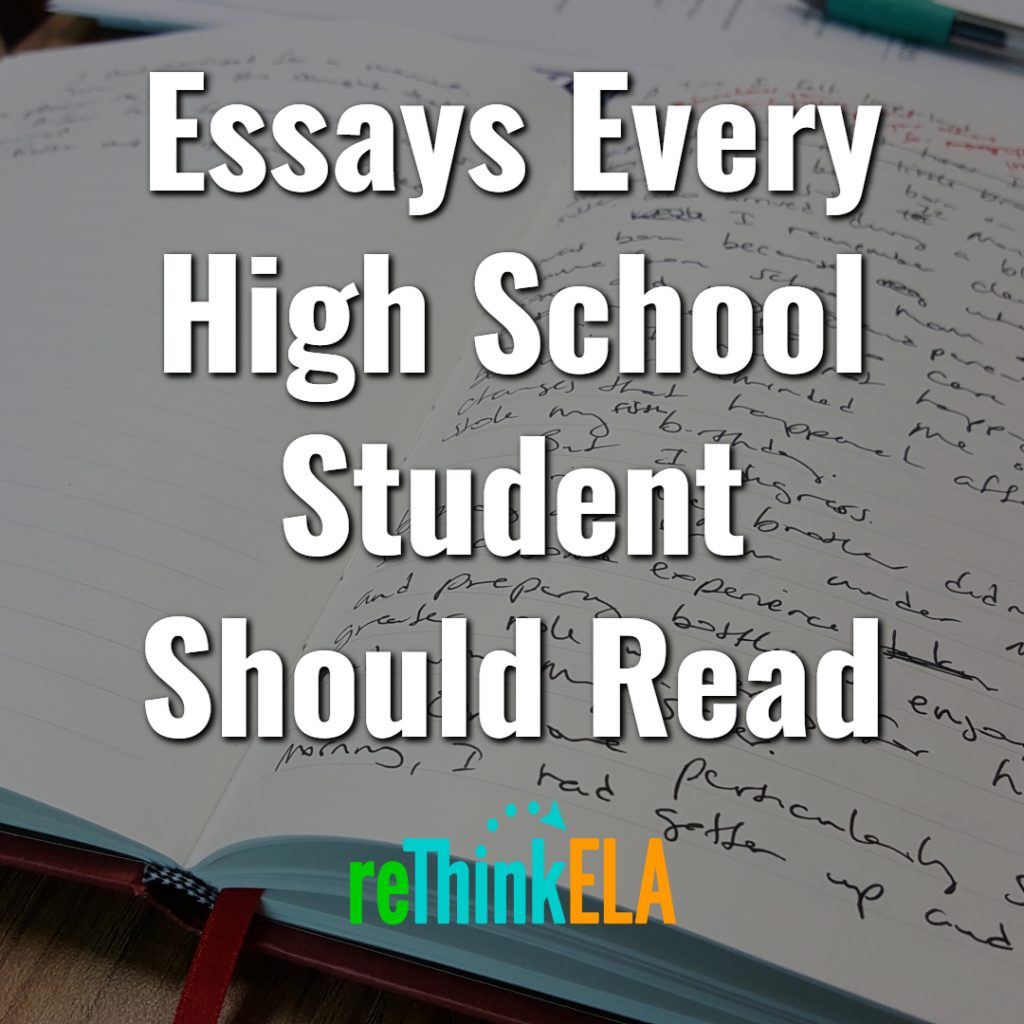
One of the most important goals of any English class should be to help students learn how to express themselves to an audience — how to tell their own stories, how to provide much-needed information, and how to convince others to see things from a different perspective.
Below are some essays students can read, not only to help them see how such writing is done in the real world, but also to learn more about the world around them.
[bctt tweet=”Need a #mentortext for student essays? Check out these exemplars for personal narrative, argumentative, and expository essay writing.”]
Note : This is a living list. I will continue adding to it as I find important essays and articles, and as my readers make suggestions.
If You Think Racism Doesn’t Exist by Jordan Womack | Lesson Plan
A 17-year-old Oklahoma author details incidents of discrimination he has faced within his own community. Brief, yet impactful, the author’s authenticity strikes readers at their core and naturally leads the audience to consider other perspectives.
Facebook hack ‘worse than when my house burned down’ says teacher by Michelle Boyd Waters, M.Ed.
When a hacker destroyed my Facebook account and I couldn’t find a way to reach out to Facebook, I decided to use my story, voice, and platform to shed light on a situation faced by people around the world. This can serve as a mentor text for students writing personal narratives on shared experiences in the context of current events.
Letter from a Vietnamese to an Iraqi Refugee by Andrew Lam
Vietnamese lecturer, journalist, and author Andrew Lam offers advice in this letter to a young Iraqi refugee he sees in a photograph on the Internet.
Allowing Teenage Boys to Love Their Friends by Jan Hoffman
Learn why early and lifelong friendships are as vital for boys as they are for girls and what happens when those friendships are fractured.
Chris Cecil: Plagiarism Gets You Fired by Leonard Pitts Jr
The Miami Herald columnist and 2004 Pulitzer Prize for Commentary winner castigates a Georgia newspaper editor for plagiarizing his work. This column would go great with this followup article from The Boston Globe: Ga. Editor is Fired for Lifting Columns .
Class Dismissed by Walter Kirn
The author of Lost in the Meritocracy postulates that getting rid of the high school senior year might be good for students.
Complaint Box | Packaging by Dylan Quinn
A high school junior complains about the impossible-to-open packaging faced by consumers of everything “from action figures to zip drives.”
Drowning in Dishes, but Finding a Home by Danial Adkison
In this 2014 essay, a teenager learns important lessons from his boss at Pizza Hut.
How to Tame a Wild Tongue by Gloria Anzaldua
An American scholar of Chicana cultural theory discusses how she maintained her identity by refusing to submit to linguistic terrorism.
Humble Beast: Samaje Perine by John Rohde
The five-time Oklahoma Sportswriter of the Year features the University of Oklahoma’s running back.
In Praise of the F Word by Mary Sherry
An adult literacy program teacher argues that allowing students to fail will actually help them.
The Joy of Reading and Writing: Superman and Me by Sherman Alexie
A Native American novelist recounts his experience loving reading and finally writing in spite of a culture that expected him to fail in the “non-Indian world” in order to be accepted.
Lane’s Legacy: One Final Ride by Keith Ryan Cartwright
A heartbreaking look back at the hours before and the circumstances surrounding Lane Frost’s untimely death, followed by reflections on his rise to fame — before and after death.
Learning to Read by Malcolm X
The 1960s Civil Rights leader writes about how educating himself in prison opened his mind and lead him to become one of the leading spokesmen for black separatism.
Learning to Read and Write by Frederick Douglass
A former slave born in 1818 discusses how he learned to read in spite of laws against teaching slaves and how reading opened his eyes to his “wretched condition, without remedy.”
Learning From Animal Friendships by Erica Goode
Scientists consider studying the phenomenon of cross-species animal friendships like the ones you see on YouTube.
Losing Everything, Except What Really Matters by Dan Barry
After a 2011 tornado destroys a house, but spares the family, a reporter writes about what’s important.
The Marked Woman by David Grann
How an Osage Indian family in Oklahoma became the prime target of one of the most sinister crimes in American history.
Meet Mikey, 8: U.S. Has Him on Watch List by Lizette Alvarez
Read about what happens if you happen to share a name of a “suspicious person” on the U.S. No-Fly List.
Newly Homeless in Japan Re-Establish Order Amid Chaos by Michael Wines
After the tsunami that resulted in nuclear disaster in 2011, a reporter writes about the “quiet bravery in the face of tragedy” of the Japanese people.
No Ordinary Joe by Rick Reilly
Why in creation did American Football Conference’s 1981 best young running back Joe Delaney jump into that pit full of water that day, even though he couldn’t swim?
Politics and the English Language By George Orwell
Animal Farm and 1984 author, Orwell correlates the degradation of the English language into multi-syllabic drivel and the corruption of the American political process.
Serving in Florida by Barbara Ehrenreich
The Nickel and Dimed: On (Not) Getting By in America author tells about her experiences attempting to survive on income of low-paying jobs.
Starvation Under the Orange Trees by John Steinbeck
John Steinbeck, who later authored the fictionalized account of Okies in California, The Grapes of Wrath, first wrote this essay documenting the starvation of migrant workers in California during the Great Depression.
To Fall in Love With Anyone, Do This by Mandy Len Catron
Is falling in love really a random event, or can two people “love smarter?”
We’ll Go Forward from this Moment by Leonard Pitts
The 2004 Pulitzer Prize for Commentary winner pens a column chronicling the toughness of the American family’s spirit in the face of the September 11, 2001 World Trade Center attacks. He wrote the column one day after the attacks.
What’s Wrong with Black English? by Rachel L. Jones
Jones, a student at Southern Illinois University in the 1980s, wrote this piece for Newsweek. In her essay, Jones adds her story and perspective to the debate over Black English.
Related topics: Mentor Texts , Teaching Writing
About the author
Michelle Boyd Waters, M.Ed.
I am a secondary English Language Arts teacher, a University of Oklahoma student working on my doctorate in Instructional Leadership and Academic Curriculum with an concentration in English Education and co-Editor of the Oklahoma English Journal. I am constantly seeking ways to amplify students' voices and choices.
A wonderful list of essays! I have neglected to teach essays as literature (only as student writing samples before we began work on an essay, after a novel). I’m looking forward to using these!
Thank you very much! I’d love to hear (or read) your feedback on the selections. Your input can help other teachers decide which essays to teach their students.
This list looks really great. Unfortunately, the first two links I chose were not working. One took me to a professors homepage and the other never opened.
Thank you for letting us know. I checked the “If you think racism doesn’t exist” went to the WordPress.com site where the author wrote his article and “Letter from a Vietnamese to an Iraqi Refugee” went to the Huffington Post article. Is it possible that your school web filter is blocking WordPress and Huffington Post?
Thank you for this. I am teaching a summer class that prepares 8th graders for high school essay writing. Trying to find a way to make it more creative and interesting, even interactive. I like the essays. If you have ideas about specific ways to use them, beyond reading and discussion, I would love to hear them.
You’re welcome! I think additional activities would depend on who your students are, their interests, and which essay(s) you plan to use. Perhaps if you join our RTE Facebook group and tell us about your kids and the essay you want to use, we can devise some activities to help them engage. Check us out here .
Comments are closed.
- Share full article
Advertisement
Supported by
The Winners of Our Personal Narrative Essay Contest
We asked students to write about a meaningful life experience. Here are the eight winning essays, as well as runners-up and honorable mentions.

By The Learning Network
Update: Join our live webinar on Oct. 8 about teaching with our Narrative Writing Contest.
In September, we challenged teenagers to write short, powerful stories about meaningful life experiences for our first-ever personal narrative essay contest .
This contest, like every new contest we start, was admittedly a bit of an experiment. Beyond a caution to write no more than 600 words, our rules were fairly open-ended, and we weren’t sure what we would get.
Well, we received over 8,000 entries from teenagers from around the world. We got stories about scoring the winning goal, losing a grandparent, learning to love one’s skin and dealing with mental illness. We got pieces that were moving, funny, introspective and honest. We got a snapshot of teenage life.
Judging a contest like this is, of course, subjective, especially with the range of content and styles of writing students submitted. But we based our criteria on the types of personal narrative essays The New York Times publishes in columns like Lives , Modern Love and Rites of Passage . We read many, many essays that were primarily reflective but, while these pieces might be well-suited for a college application, they weren’t exactly the short, powerful stories we were looking for in this contest.
The winning essays we selected were, though, and they all had a few things in common that set them apart:
They had a clear narrative arc with a conflict and a main character who changed in some way. They artfully balanced the action of the story with reflection on what it meant to the writer. They took risks, like including dialogue or playing with punctuation, sentence structure and word choice to develop a strong voice. And, perhaps most important, they focused on a specific moment or theme — a conversation, a trip to the mall, a speech tournament, a hospital visit — instead of trying to sum up the writer’s life in 600 words.
Below, you’ll find these eight winning essays, published in full. Scroll to the bottom to see the names of all 35 finalists we’re honoring — eight winners, eight runners-up and 19 honorable mentions. Congratulations, and thank you to everyone who participated!
The Winning Essays
Nothing extraordinary, pants on fire, eggs and sausage, first impressions, cracks in the pavement, sorry, wrong number, the man box.
By Jeniffer Kim
It was a Saturday. Whether it was sunny or cloudy, hot or cold, I cannot remember, but I do remember it was a Saturday because the mall was packed with people.
I was with my mom.
Mom is short. Skinny. It is easy to overlook her in a crowd simply because she is nothing extraordinary to see.
On that day we strolled down the slippery-slick tiles with soft, inconspicuous steps, peeking at window boutiques in fleeting glances because we both knew we wouldn’t be buying much, like always.
I remember I was looking up at the people we passed as we walked — at first apathetically, but then more attentively.
Ladies wore five-inch heels that clicked importantly on the floor and bright, elaborate clothing. Men strode by smelling of sharp cologne, faces clear of wrinkles — wiped away with expensive creams.
An uneasy feeling started to settle in my chest. I tried to push it out, but once it took root it refused to be yanked up and tossed away. It got more unbearable with every second until I could deny it no longer; I was ashamed of my mother.
We were in a high-class neighborhood, I knew that. We lived in a small, overpriced apartment building that hung on to the edge of our county that Mom chose to move to because she knew the schools were good.
We were in a high-class neighborhood, but as I scrutinized the passers-by and then turned accusing eyes on Mom, I realized for the first time that we didn’t belong there.
I could see the heavy lines around Mom’s eyes and mouth, etched deep into her skin without luxurious lotions to ease them away. She wore cheap, ragged clothes with the seams torn, shoes with the soles worn down. Her eyes were tired from working long hours to make ends meet and her hair too gray for her age.
I looked at her, and I was ashamed.
My mom is nothing extraordinary, yet at that moment she stood out because she was just so plain.
Mumbling I’d meet her at the clothes outlet around the corner, I hurried away to the bathroom. I didn’t want to be seen with her, although there was no one important around to see me anyway.
When I finally made my way to the outlet with grudging steps, I found that Mom wasn’t there.
With no other options, I had to scour the other stores in the area for her. I was dreading returning to her side, already feeling the secondhand embarrassment that I’d recently discovered came with being with her.
I couldn’t have been more wrong. Mom was standing in the middle of a high-end store, holding a sweater that looked much too expensive.
She said, “This will look good on you. Do you want it?”
It was much too expensive. And I almost agreed, carelessly, thoughtlessly.
Then I took a closer look at the small, weary woman with a big smile stretching across her narrow face and a sweater in her hands, happy to be giving me something so nice, and my words died in my throat.
I felt like I’d been dropped into a cold lake.
Her clothes were tattered and old because she spent her money buying me new ones. She looked so tired and ragged all the time because she was busy working to provide for me. She didn’t wear jewelry or scented perfumes because she was just content with me.
Suddenly, Mother was beautiful and extraordinarily wonderful in my eyes.
I was no longer ashamed of her, but of myself.
“Do you want it?” My mom repeated.
“No thanks.”
By Varya Kluev
I never kissed the boy I liked behind the schoolyard fence that one March morning. I never had dinner with Katy Perry or lived in Kiev for two months either, but I still told my entire fourth-grade class I did.
The words slipped through my teeth effortlessly. With one flick of my tongue, I was, for all anybody knew, twenty-third in line for the throne of Monaco. “Actually?” the girls on the swings beside me would ask, wide eyes blinking with a childlike naivety. I nodded as they whispered under their breath how incredible my fable was. So incredible they bought into it without a second thought.
I lied purely for the ecstasy of it. It was narcotic. With my fabrications, I became the captain of the ship, not just a wistful passer-by, breath fogging the pane of glass that stood between me and the girls I venerated. No longer could I only see, not touch; a lie was a bullet, and the barrier shattered. My mere presence demanded attention — after all, I was the one who got a valentine from Jason, not them.
This way I became more than just the tomboyish band geek who finished her multiplication tables embarrassingly fast. My name tumbled out of their mouths and I manifested in the center of their linoleum lunch table. I became, at least temporarily, the fulcrum their world revolved around.
Not only did I lie religiously and unabashedly — I was good at it. The tedium of my everyday life vanished; I instead marched through the gates of my alcazar, strode up the steps of my concepts, and resided in my throne of deceit. I believed if I took off my fraudulent robe, I would become plebeian. The same aristocracy that finally held me in high regard would boot me out of my palace. To strip naked and exclaim, “Here’s the real me, take a look!” would lead my new circle to redraw their lines — they would take back their compliments, sit at the table with six seats instead of eight, giggle in the back of the class when I asked a question. I therefore adjusted my counterfeit diadem and continued to praise a Broadway show I had never seen.
Yet finally lounging in a lavender bedroom one long-sought-after day, after absently digesting chatter about shows I didn’t watch and boys I didn’t know, I started processing the floating conversations. One girl, who I had idolized for always having her heavy hair perfectly curled, casually shared how her parents couldn’t afford to go on their yearly trip the coming summer. I drew in an expectant breath, but nobody scoffed. Nobody exchanged a secret criticizing glance. Instead, another girl took her spoon of vanilla frosting out of her cheek and with the same air of indifference revealed how her family wasn’t traveling either. Promptly, my spun stories about swimming in crystal pools under Moroccan sun seemed to be in vain.
The following Monday, the girls on the bus to school still shared handfuls of chocolate-coated sunflower seeds with her. At lunch, she wasn’t shunned, wasn’t compelled to sit at a forgotten corner table. For that hour, instead of weaving incessant fantasies, I listened. I listened to the girls nonchalantly talk about yesterday’s soccer game where they couldn’t score a single goal. Listened about their parent’s layoff they couldn’t yet understand the significance of. I listened and I watched them listen, accepting and uncritical of one another no matter how relatively vapid their story. I then too began to talk, beginning by admitting that I wasn’t actually related to Britney Spears.
By Ryan Young Kim
When first I sat down in the small, pathetic excuse of a cafeteria the hospital had, I took a moment to reflect. I had been admitted the night before, rolled in on a stretcher like I had some sort of ailment that prevented me from walking.
But the nurses in the ward were nice to me, especially when they saw that I wasn’t going to be one of the violent ones. They started telling me something, but I paid no attention; I was trying to take in my surroundings. The tables were rounded, chairs were essentially plastic boxes with weight inside, and there was no real glass to be seen.
After they filled out the paperwork, the nurses escorted me to my room. There was someone already in there, but he was dead asleep. The two beds were plain and simple, with a cheap mattress on top of an equally cheap wooden frame. One nurse stuck around to hand me my bedsheets and a gown that I had to wear until my parents dropped off clothes.
The day had been exhausting, waiting for the psychiatric ward to tell us that there was a bed open for me and the doctors to fill out the mountains of paperwork that come with a suicide attempt.
Actually, there had been one good thing about that day. My parents had brought me Korean food for lunch — sullungtang , a fatty stew made from ox-bone broth. God, even when I was falling asleep I could still taste some of the rice kernels that had been mixed into the soup lingering around in my mouth.
For the first time, I felt genuine hunger. My mind had always been racked with a different kind of hunger — a pining for attention or just an escape from the toil of waking up and not feeling anything. But I always had everything I needed — that is, I always had food on my plate, maybe even a little too much. Now, after I had tried so hard to wrench myself away from this world, my basic human instinct was guiding me toward something that would keep me alive.
The irony was lost on me then. All I knew was that if I slept earlier, that meant less time awake being hungry. So I did exactly that. Waking up the next day, I was dismayed to see that the pangs of hunger still rumbled through my stomach. I slid off my covers and shuffled out of my room. The cafeteria door was already open, and I looked inside. There was a cart of Styrofoam containers in the middle of the room, and a couple people were eating quietly. I made my way in and stared.
I scanned the tops of the containers — they were all marked with names: Jonathan, Nathan, Kristen — and as soon as I spotted my name, my mouth began to water.
My dad would sometimes tell me about his childhood in a rural Korean village. The hardships he faced, the hunger that would come if the village harvest floundered, and how he worked so hard to get out — I never listened. But in that moment, between when I saw my container and I sat down at a seat to open it, I understood.
The eggs inside were watery, and their heat had condensated water all over, dripping onto everything and making the sausages soggy. The amount of ketchup was pitiful.
But if I hadn’t been given plastic utensils, I think I would have just shoved it all into my mouth, handful by handful.
By Isabel Hui
When I woke up on August 4, 2016, there was only one thing on my mind: what to wear. A billion thoughts raced through my brain as wooden hangers shuffled back and forth in the cramped hotel closet. I didn’t want to come off as a try-hard, but I also didn’t want to be seen as a slob. Not only was it my first day of high school, but it was my first day of school in a new state; first impressions are everything, and it was imperative for me to impress the people who I would spend the next four years with. For the first time in my life, I thought about how convenient it would be to wear the horrendous matching plaid skirts that private schools enforce.
It wasn’t insecurity driving me to madness; I was actually quite confident for a teenage girl. It was the fact that this was my third time being the new kid. Moving so many times does something to a child’s development … I struggled finding friends that I could trust would be there for me if I picked up and left again. But this time was different because my dad’s company ensured that I would start and finish high school in the same place. This meant no instant do-overs when I pick up and leave again. This time mattered, and that made me nervous.
After meticulously raiding my closet, I emerged proudly in a patterned dress from Target. The soft cotton was comfortable, and the ruffle shoulders added a hint of fun. Yes, this outfit was the one. An hour later, I felt just as powerful as I stepped off the bus and headed toward room 1136. But as I turned the corner into my first class, my jaw dropped to the floor.
Sitting at her desk was Mrs. Hutfilz, my English teacher, sporting the exact same dress as I. I kept my head down and tiptoed to my seat, but the first day meant introductions in front of the whole class, and soon enough it was my turn. I made it through my minute speech unscathed, until Mrs. Hutfilz stood up, jokingly adding that she liked my style. Although this was the moment I had been dreading from the moment I walked in, all the anxiety that had accumulated throughout the morning surprisingly melted away; the students who had previously been staring at their phones raised their heads to pay attention as I shared my story. My smile grew as I giggled with my peers, ending my speech with “and I am very stylish, much like my first period teacher.” After class, I stayed behind and talked to Mrs. Hutfilz, sharing my previous apprehension about coming into a new school and state. I was relieved to make a humorous and genuine connection with my first teacher, one that would continue for the remainder of the year.
This incident reminded me that it’s only high school; these are the times to have fun, work hard, and make memories, not stress about the trivial details. Looking back four years later, the ten minutes I spent dreading my speech were really not worth it. While my first period of high school may not have gone exactly the way I thought it would, it certainly made the day unforgettable in the best way, and taught me that Mrs. Hutfilz has an awesome sense of style!
By Adam Bernard Sanders
It was my third time sitting there on the middle school auditorium stage. The upper chain of braces was caught in my lip again, and my palms were sweating, and my glasses were sliding down my nose. The pencil quivered in my hands. All I had to do was answer whatever question Mrs. Crisafulli, the history teacher, was going to say into that microphone. I had answered 26 before that, and 25 of those correctly. And I was sitting in my chair, and I was tapping my foot, and the old polo shirt I was wearing was starting to constrict and choke me. I pulled pointlessly at the collar, but the air was still on the outside, only looking at the inside of my throat. I was going to die.
I could taste my tongue in my mouth shriveling up. I could feel each hard-pumping heartbeat of blood travel out of my chest, up through my neck and down my arms and legs, warming my already-perspiring forehead but leaving my ghost-white fingers cold and blue. My breathing was quick. My eyes were glassy. I hadn’t even heard the question yet.
Late-night readings of my parents’ anatomy textbooks had told me that a sense of impending doom was the hallmark of pulmonary embolism, a fact that often bubbled to the surface of my mind in times like these. Almost by instinct, I bent my ring and little fingers down, holding them with my thumb as the two remaining digits whipped to my right wrist and tried to take my pulse. Mr. Mendoza had taught us this last year in gym class. But I wasn’t in gym class that third period. I was just sitting on the metal folding chair, waiting for Mrs. Crisafulli to flip to the right page in her packet for the question.
Arabella had quizzed me in second-period French on the lakes of Latin America. Nicaragua. Atitlán. Yojoa. Lake Titicaca, that had made Raj, who sat in front of me, start giggling, and Shannon, who sat three desks up and one to the left, whip her head around and raise one fist to her lips, jab up her index finger, and silence us. Lakes were fed by rivers, the same rivers that lined the globe on my desk like the cracks in the pavement I liked to trace with my shoe on the walk home. Lake Nicaragua drains into the San Juan River, which snakes its way around the port of Granada to empty into the Caribbean Sea. I knew that.
At that moment I was only sure of those two things: the location of Lake Nicaragua and my own impending doom. And I was so busy counting my pulse and envisioning my demise that I missed Mrs. Crisafulli’s utterance of the awaited question into her microphone, as I had each year in the past as one of the two people left onstage.
“ … Coldest … on earth,” was all I heard. My pencil etched shaggy marks as my shaking hands attempted to write something in the 20 seconds remaining.
“Asia,” I scrawled.
So, for the third time in three years, I got it wrong, and for the third time, I didn’t die. I walked home that day, tracing the faults in the pavement and wondering what inside me was so cracked and broken. Something had to be fissured inside, like the ridges and rivers on my desk globe that I would throw out later that evening, but fish from the trash can when the sun rose the next day.
By Michelle Ahn
My phone buzzes. An unfamiliar number with a 512 area code — I later find out it’s from Texas. It’s a selfie of a 30-something man, smiling with his family, a strange picture to receive as I live halfway across the country.
For the past three years, I — a 14-year-old girl living in Virginia — have been getting texts meant for this man, Jared. Over the years, I’ve pieced together parts of who he is; middle-aged, Caucasian, and very popular according to the numerous messages I’ve received for him.
Throughout this time, I’ve also been discovering who I am. When I received the first text, I was a playful sixth grader, always finding sly ways to be subversive in school and with friends. With this new method of mischief in my hands, naturally, I engaged:
“My sweet momma just told me that BYU Texas Club is holding a Texas Roundup free BBQ dinner on October 10th! Thought y’all would enjoy,” came one of the texts.
After staring at the message for a while, I responded.
As time went on, the story of the mystery man deepened. I was halfway through sixth grade, for example, when I learned he was part of the “Elder’s Quorum,” a rather ominous-sounding group. Looking it up, I learned that it was not a cult, as I’d initially thought, but rather an elite inner circle within the Mormon Church.
This was around the same time my family had stopped going to church. I’d started to spend more time taking art classes and trying out various sports — tennis, basketball, even archery — and soon church fell to the side. Instead, I meddled in the Quorum’s group texts; when a message came about a member moving away, I excitedly responded, “Let me help y’all out, brother!”
I’m not sure exactly when it happened, but after a while I started to feel guilty about this deception. I wondered if I’d somehow ruined Jared’s reputation, if his friends were turned off by my childish responses. I was also dealing with changes within my friend group at the time; the biggest change being letting go of a close but toxic friend; I realized that I needed friendships that were more mutually supportive.
Shortly after, I got a phone call from a strange woman. She started talking about the struggles in her life; her children, her job, even about how she wanted to leave Texas forever. In comparison, my own problems — the B minus I’d gotten, the stress of an upcoming archery tournament, the argument I had with my sister — all seemed superficial. I timidly informed her I wasn’t Jared, and her flustered response told me that I should have told her at the start of the call.
A while later, I got another text: “Congratulations on getting married!” It had never occurred to me how much Jared’s life had changed since I had received his number. But of course it did; over time, I’d outgrown my prankster middle school self, gained the confidence to build a solid friend group, and devoted myself to my primary loves of art and archery. Why wouldn’t Jared also be settling into his own life too?
Though I’ve since taken every opportunity to correct those who text Jared, it still happens every once in a while. Just last month, I got another random text; all it said was: “Endoscopy!” When I got it, I laughed, and then I wrote back.
“Hey, sorry, you have the wrong number. But I hope Jared’s doing well.”
By Maria Fernanda Benavides
“Mayfier? Marfir?” the tournament judge called squinting her eyes, trying to find the spelling error, although there was no error.
“It’s Mafer. It’s a nickname for my full name, Maria Fernanda.”
She stared at me blankly.
“My parents are creative,” I lied, and she laughed.
“O.K., Mahfeer, you’re up!”
I walk to the center and scanned the room before starting as instructed. I took a deep breath.
I reminded myself, “Use your voice.”
I spoke loudly at first, trying to hide the fact that I was overthinking every single word that came out of my mouth. As my performance continued, the artificial confidence became natural, and I started speaking from my heart as I told the story of my experience as an immigrant woman, and I described how much I missed my father who had to travel back and forth every weekend to see my mom and me, and how disconnected I felt from my family, and how I longed to have a place I could call home.
My performance came to an end, and I made my way back to my seat with newly found optimism as I reflected on how performing had consumed me.
I used my voice. Finally. I had found my home in the speech program.
Waiting for the speech tournament to post the names of the finalists was excruciating. I jumped off my seat every time a staff member passed by. I didn’t care about accumulating state points or individual recognition. I wanted the chance to speak again.
Finally, a girl walked up to the oratory postings with a paper on her hand, and the entire cafeteria surrounded her, impatiently waiting to see who the finalists were. Then, I saw it.
My name. Written in dense, black letters.
I smiled to myself.
This time, as I walked to the oratory final, I did so by myself, as I had finally acquired self-assurance needed to navigate the quiet hallways of the high school. I could only hear the heels of the two girls behind me.
“I heard that Saint Mary’s Hall freshman made it to oratory finals,” one of them said, obviously speaking about me. “She broke over me. I didn’t see her performance. Did you? Did you see her performance? What is her speech about?” she questioned the other one.
“It’s about being a Mexican immigrant.”
“Oh, so that’s why she broke.”
“It’s the same pity narrative, there’s nothing different about it.”
Suddenly, the confidence that I had acquired from the previous rounds vanished, and I found myself wishing that I had my older, more experienced teammates by my side to help me block the girls’ words. But no one was there.
I thought my narrative was what made my words matter, what made me matter.
But they didn’t matter. Not anymore. From that moment on, I knew I would be recognized around the circuit as the Mexican girl whose name no one knows how to pronounce. I didn’t even need to speak about my identity to be identified. Everyone would recognize me not for my achievement or my being, but by the peculiar way I pronounce words. I could speak about different topics, but it felt like it wouldn’t make a difference. It felt like my voice didn’t make a difference.
“Mafer, how did it feel?” my coach asked me after the round. “It felt amazing!” I lied.
I didn’t feel anything. Not anymore. Speech gave me a voice, but it also took it away.
By Gordon Lewis
We’re all average boys: hard working in school, spending every minute together in the summer, and doing our best to pretend we don’t have a worry in the world. The facts are no different as the sun is beginning to set on a warm July evening. Sam and I say goodbye to Ben, stepping out of our best friend’s house.
“My sister is going to pick me up while we’re walking, is that O.K.?” I ask.
“Actually, she can probably drive you home, too.”
“Sounds good,” says Sam, but lacking his usual upbeat, comedic energy. Neither of us says anything else, but I’m O.K. with it, we just keep walking. I look around, admiring the still, peaceful park as the warm summer breeze brushes across my face. The crickets are chirping and an owl sings along between the soft hum of cars rolling along nearby. It’s nature’s tune of serenity.
I almost forgot Sam was with me until he asked, “Can I ask you kind of a weird question?”
“Sure,” I say, expecting a joke in poor taste as per usual.
“You don’t have to answer if you don’t want to,” he says before asking.
More hesitantly, I say, “O.K.”
“Do you have someone that you talk to about like deeper stuff … Like more emotional stuff?” Silence hits us like a brick wall: The crickets stop chirping, the owl stops hooting, even the cars stop driving by. It’s deafening. I’m only shocked at the question because it’s Sam, one of the happiest and funniest people I know.
I’m wondering. My disappointment takes over just as quickly as my hope fades as I fail to come up with a name. In the end, the closest thing I can think of is the book I occasionally write in when I’m feeling sad or stressed.
“Huh,” I say quietly, “I’ve never really thought about that, but I guess not.”
“Yeah, I didn’t either, but at camp we did activities and had talks that led to more emotional conversations.” I’m silently both jealous and proud of him, but it’s mostly jealousy.
“It’s funny,” I say, “in English we always joked about that TED Talk guy talking about the man box, but it’s actually so true. We shouldn’t feel like we can’t talk about deeper stuff like that.”
“Yeah,” laughed Sam. Silence drapes over us again, but this time it’s more comfortable. I’m lost in my thoughts trying to think of what to say next, but there’s too much. I’ve never had an opportunity like this before. However it’s not shocking or overwhelming, even though it’s with Sam of all people — instead it’s therapeutic.
The silence is broken once again by Sam:
“Like I never told you guys that my parents got divorced.”
“I’m-I’m sorry,” I say, “That really sucks.” I’m disappointed in myself for not saying more.
“It’s O.K.,” Sam says, but I know he’s lying. I can feel his sadness.
Drowning in my thoughts, I try to pick out something to say. But there’s too much to say. There are too many options after being silent for 16 years.
Headlights appear in front of us, and for a split second I’m relieved, but it rapidly turns into regret.
Knowing it’s Rose, I quickly tell sam, “If you ever want to talk again just let me know.”
I say hi to Rose, masking my solemn, thoughtful mood as tiredness. The warm breeze gives my cheek one final kiss; nature resumes her number, and the cars roll by again as Sam and I reluctantly step into the car.
In alphabetical order by the writer’s last name
“Sorry, Wrong Number” by Michelle Ahn
“Speechless” by Maria Fernanda Benavides
“First Impressions” by Isabel Hui
“Nothing Extraordinary” by Jeniffer Kim
“Eggs and Sausage" by Ryan Young Kim
“Pants on Fire” by Varya Kluev
“The Man Box” by Gordon Lewis
“Cracks in the Pavement” by Adam Bernard Sanders
“The First (and Last) Time Speedy Wasn’t Speedy Enough” by Maya Berg
“Searching for Air” by Sydney Do
“Fear on My Mind” by Daytona Gerhardy
“Under the Starry Sky” by Letian Li
“Chinatown Diptych” by Jeffrey Liao
“They” by Haven Low
“The Vigil” by Beda Lundstedt
“How My Brother Taught Me to Drive” by Sarah Shapiro
Honorable Mentions
“The Six in Mid-August” by Liah Argiropoulos
“‘Those Aren’t Scratches Are They?’” by Casey Barwick
“Brown Is Beautiful” by Tiffany Borja
“I Am Ordinary, After All” by Rebecca Braxley
“Torn” by Melanie D.
“The Stupid Seven” by Madeline G.
“Speak No Evil” by Amita Goyal
“Building My Crown” by Ambar Guzman
“Me, Myself, and a Peanut Butter and Jelly Sandwich” by Zachary Hommel
“The Tomato” by Raymond Huang
“Out” by Michael H.
“Cold Noodles With a Side of Birdballs” by Audrey Koh
“Banya in Siberia” by Arshiya Sanghi
“Traffic” by Kecia Seo
“The Power of Ambiguity” by Marcus Shallow
“Land Mine” by Geneve Thomas-Palmer
“How to Fall Asleep With the Lights On” by Caroline Wei
“The Taste of Tofu” by Amy Zhou
“The Newcomer’s Journey” by Maria Z.
Thank you to all our contest judges!
Edward Bohan, Amanda Christy Brown, Elda Cantú, Julia Carmel, Elaine Chen, Nancy Coleman, Nicole Daniels, John Dorman, Shannon Doyne, Jeremy Engle, Tracy Evans, Ross Flatt, Vivian Giang, Caroline Crosson Gilpin, Michael Gonchar, Lovia Gyarkye, Annissa Hambouz, Karen Hanley, Christine Hauser, Susan Josephs, Shira Katz, Dahlia Kozlowsky, Megan Leder, Miya Lee, Debbie Leiderman, Shauntel Lowe, Keith Meatto, Sue Mermelstein, Amelia Nierenberg, Anna Nordeen, John Otis, Ken Paul, Pia Peterson, Natalie Proulx, Nancy Redd, Kenneth Rosen, Rebecca Rufo-Tepper, Kristina Samulewski, Meghan Stoddard, Brett Vogelsinger, Bonnie Wertheim, Jack Wheeler, Lena Wilson, Sanam Yar

High School Essay
High school essay generator.
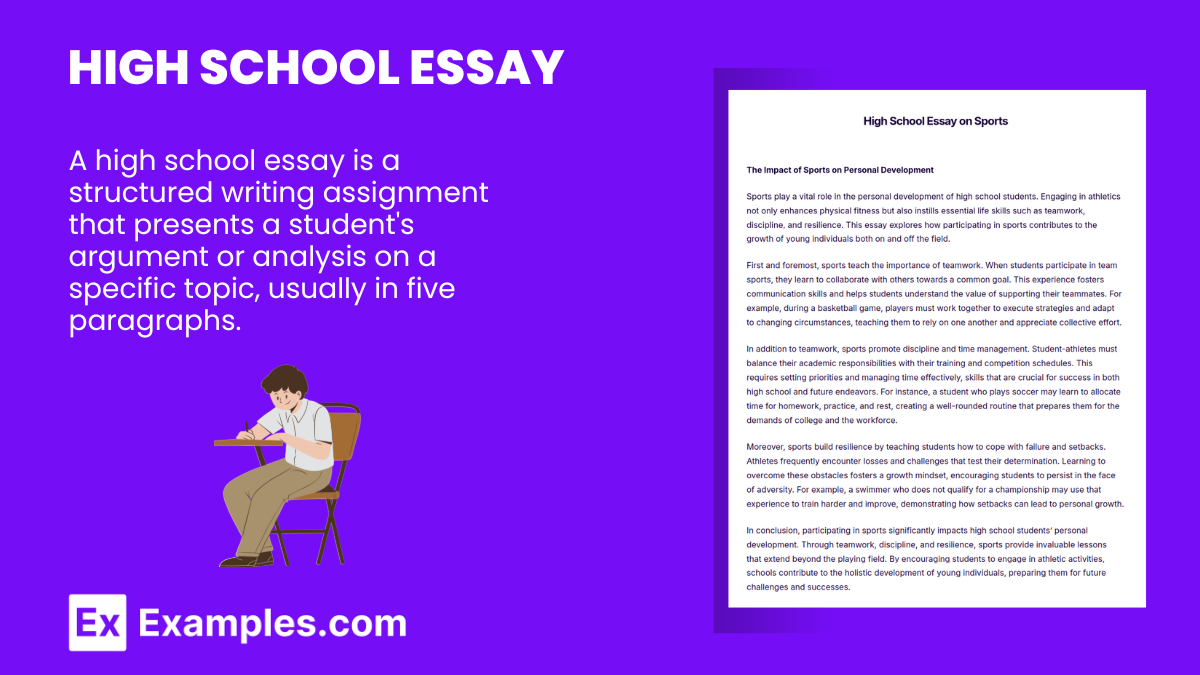
Navigating the complexities of High School Essay writing can be a challenging yet rewarding experience. Our guide, infused with diverse essay examples , is designed to simplify this journey for students. High school essays are a crucial part of academic development, allowing students to express their thoughts, arguments, and creativity. With our examples, students learn to structure their essays effectively, develop strong thesis statements, and convey their ideas with clarity and confidence, paving the way for academic success.
It is a good way to practice every student’s writing skills in writing which they might find useful when they reach college. Others might even be inspired to continue writing and take courses that are related to it.
When you are in high school, it is definite that you are expected to do some write-ups and projects which require pen and paper. Yes. You heard that right. Your teachers are going to let you write a lot of things starting from short stories to other things like expository essays. However, do not be intimidated nor fear the things that I have just said. It is but a normal part of being a student to write things. Well, take it from me. As far as I can recall, I may have written about a hundred essays during my entire high school years or maybe more. You may also see what are the parts of an essay?
What is High School Essay?
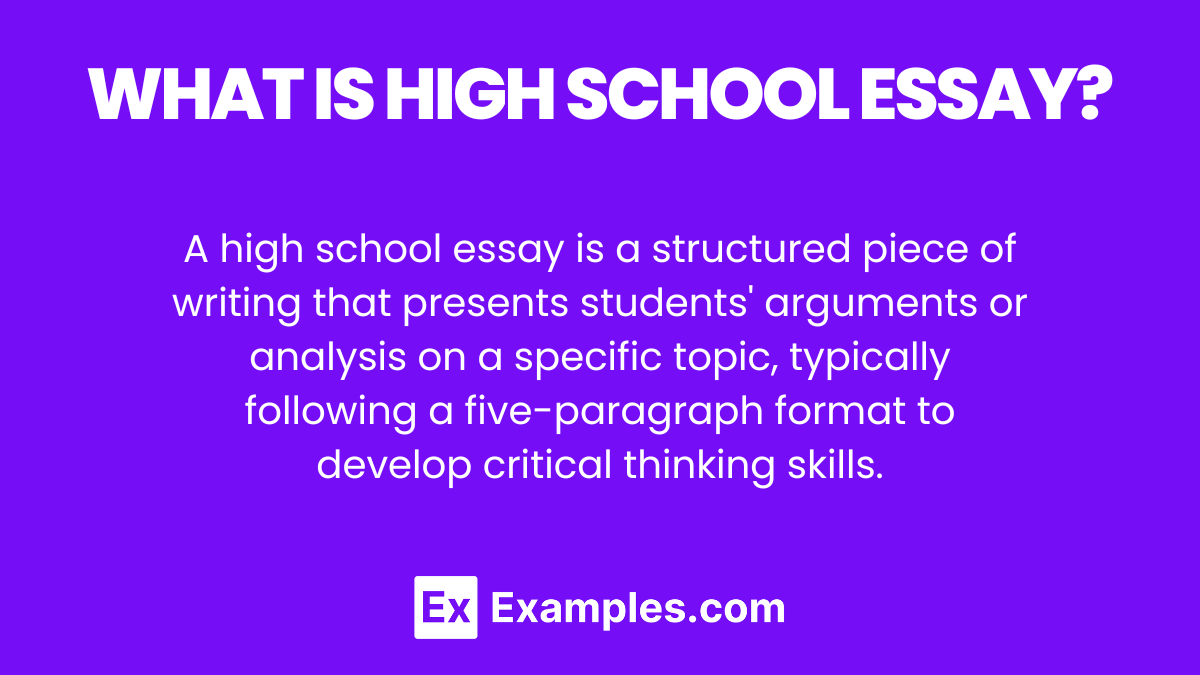
High School Essay Bundle
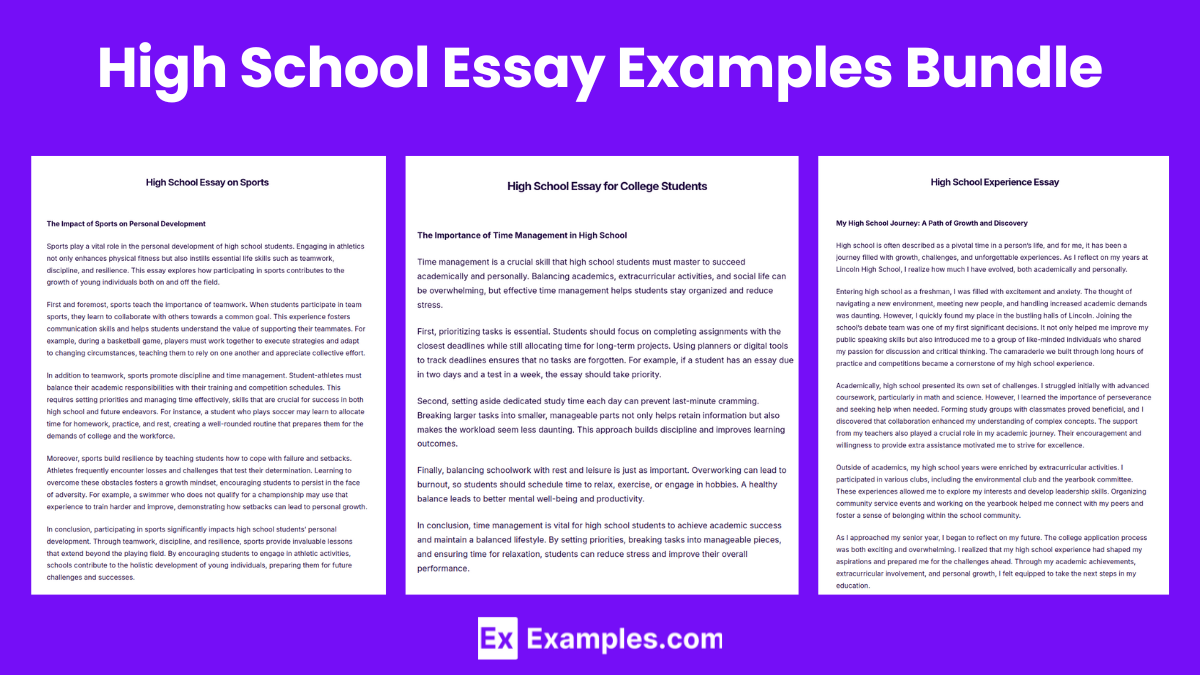
Download High School Essay Bundle
High School Essay Format
Opening remarks.
Greeting : Start with a warm and respectful greeting to address the audience and set a positive tone. Introduction : Briefly introduce the purpose of your essay, outlining what you intend to discuss or explore. Be clear and direct, allowing your readers to understand the direction of your argument.
Body of the Essay
Purpose : Explain the main objective of the essay. Clarify the topic being discussed and why it is important or relevant to your audience. Keep the introduction concise while ensuring it captures attention.
Acknowledgments
Key Figures : Recognize any important figures, events, or ideas that play a significant role in the essay. This could be historical figures, concepts from literature, or notable advancements in the topic you are covering. Supporting Details : Provide in-depth analysis of the key points. Each paragraph should focus on one specific idea, supported by evidence such as facts, examples, or quotes. Counterarguments : Acknowledge differing opinions or perspectives. Present these viewpoints and explain why your argument remains valid or superior. Additional Insights : Introduce any relevant contributions from experts or key findings that reinforce your main argument. Offer further discussion on how these points add depth to the topic.
Closing Remarks
Summarize : Recap the essential points discussed in the essay. Reiterate your argument or thesis, ensuring that it ties together all the evidence and ideas you have presented. Final Thoughts : Offer concluding thoughts that reflect on the broader significance of your topic. Leave the reader with something to think about, perhaps posing a question or suggesting future areas of exploration. Farewell : End with a respectful closure, reinforcing the purpose of your essay and its overall message, ensuring that the reader feels the argument has been effectively concluded.
High School Essay Example
The Importance of Education in Shaping the Future Education is often regarded as the cornerstone of personal and societal growth. It plays a crucial role in equipping individuals with the knowledge, skills, and values necessary to navigate an increasingly complex world. While it is widely acknowledged that education helps people to pursue their professional goals, its impact extends far beyond career preparation. It shapes individuals’ character, fosters critical thinking, and encourages responsible citizenship, all of which contribute to building a better future. One of the key ways education shapes the future is through the development of critical thinking skills. In a world filled with information, individuals must be able to analyze, evaluate, and synthesize knowledge effectively. Education empowers students to ask questions, challenge assumptions, and approach problems from multiple perspectives. This ability to think critically is essential not only in academic settings but also in everyday life. For example, in a democratic society, an educated population is better equipped to make informed decisions about political matters, understand global issues, and engage in meaningful discussions. Moreover, education promotes social responsibility and ethical behavior. Schools do not just teach academic subjects; they also play a significant role in instilling values such as integrity, respect, and empathy. These values are fundamental in fostering a harmonious society. Through education, students learn the importance of working together, appreciating diversity, and contributing to the welfare of their communities. By shaping the moral compass of future generations, education ensures that people are not only knowledgeable but also kind, compassionate, and committed to the greater good. In addition to personal growth, education also drives societal progress. It has the power to break cycles of poverty, improve public health, and promote economic development. In many countries, access to education has been a critical factor in reducing inequality and promoting social mobility. By investing in education, societies can cultivate a skilled workforce that drives innovation and economic growth. Furthermore, educated citizens are more likely to engage in civic activities, volunteer for community service, and participate in the democratic process, thereby strengthening the social fabric. While education offers numerous benefits, challenges such as unequal access to quality education persist. Many students around the world still face barriers such as poverty, discrimination, and lack of resources. Addressing these challenges requires concerted efforts from governments, organizations, and communities to ensure that every individual, regardless of background, has the opportunity to receive a high-quality education. By doing so, we can create a more equitable and prosperous world for future generations.
Short High School Essay
Why Education Matters Education is vital for personal growth and the development of society. It provides the foundation for acquiring knowledge, skills, and values that help individuals succeed in life. Through education, people learn to think critically, solve problems, and make informed decisions. These abilities are essential in today’s fast-paced and ever-changing world. Beyond academics, education instills important life values such as respect, responsibility, and empathy. Schools not only teach facts but also shape students’ character, preparing them to be productive and ethical members of society. Education also drives economic and social progress, as it opens doors to better job opportunities and helps reduce inequality. While access to quality education remains a challenge for many, it is a crucial investment in both individual success and societal advancement. Ultimately, education empowers people to create a brighter future for themselves and their communities.
High School Essay for College Students
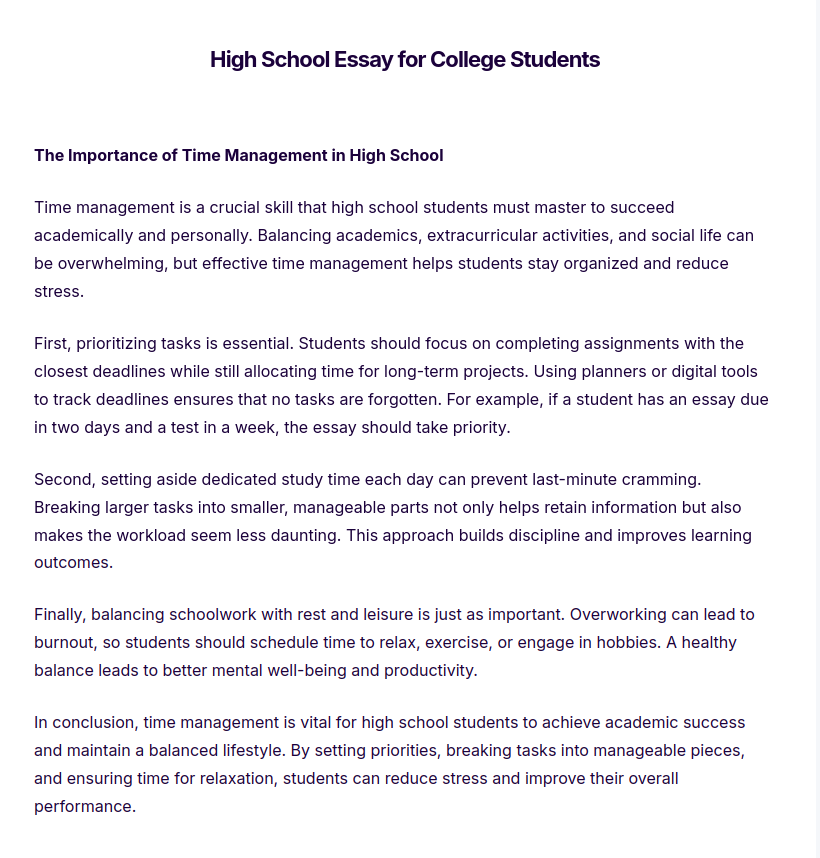
High School Essay on Sports
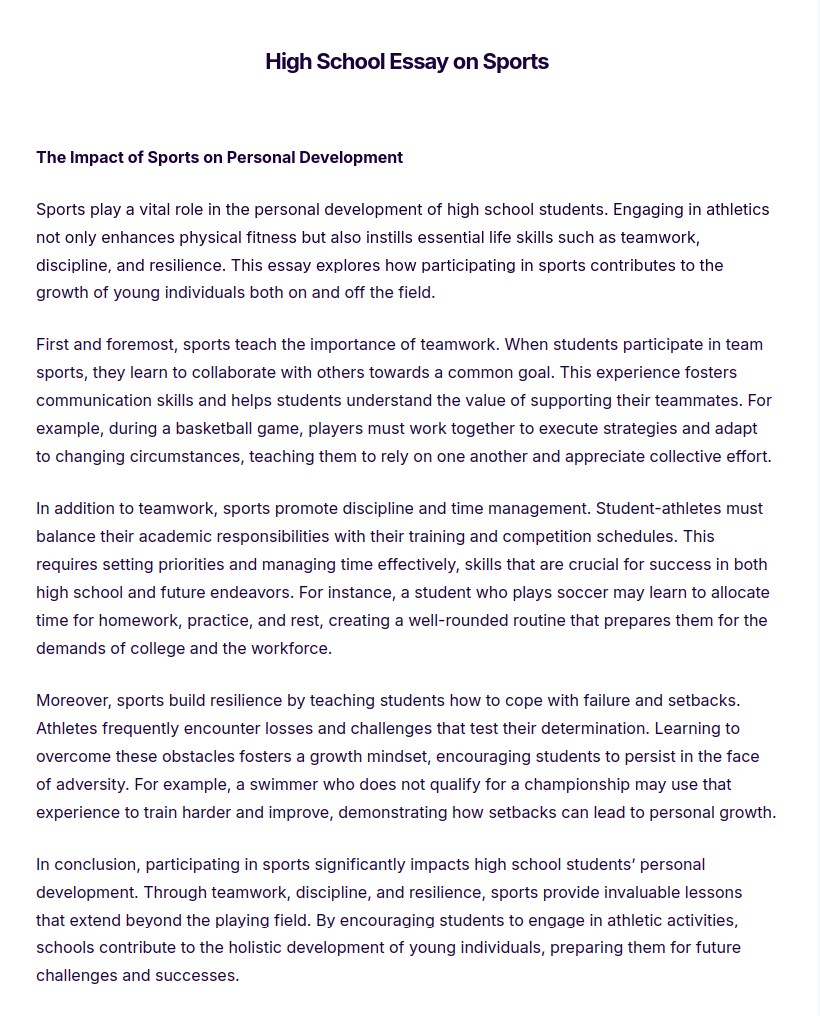
High School Experience Essay
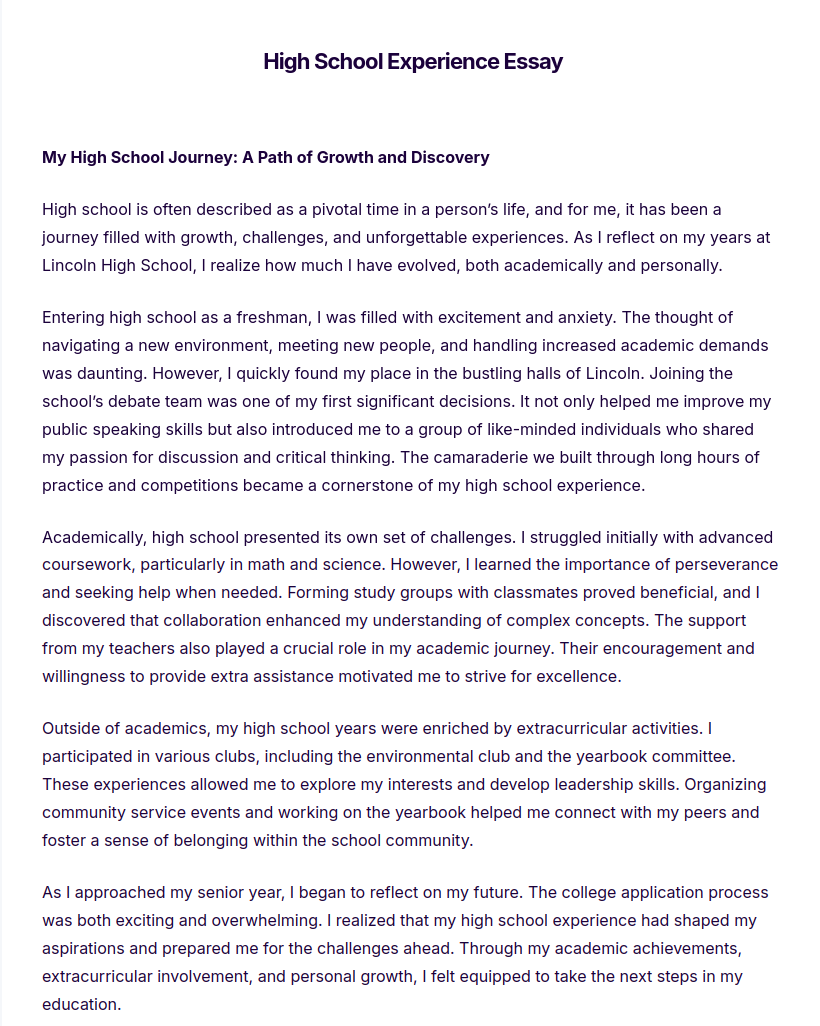
More High School Essay Examples and Samples
- High School College Essay
- High School Essay for Scholarship
- High School Essay on Agriculture
- High School Argumentative Essay
- Private High School Essay
- High School Persuasive Essay
- High School Admission Essay
- High School Narrative Essay
- High School Personal Essay
High School Essay Examples & Templates
High school self introduction essay template.
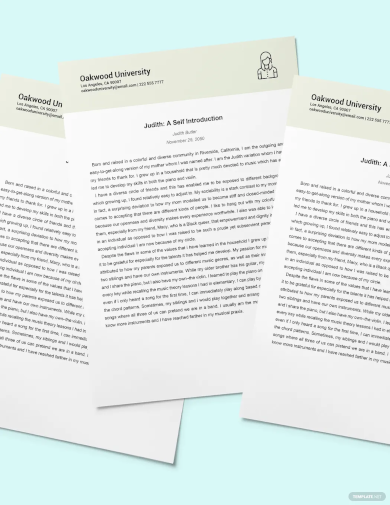
Sample High School Essay
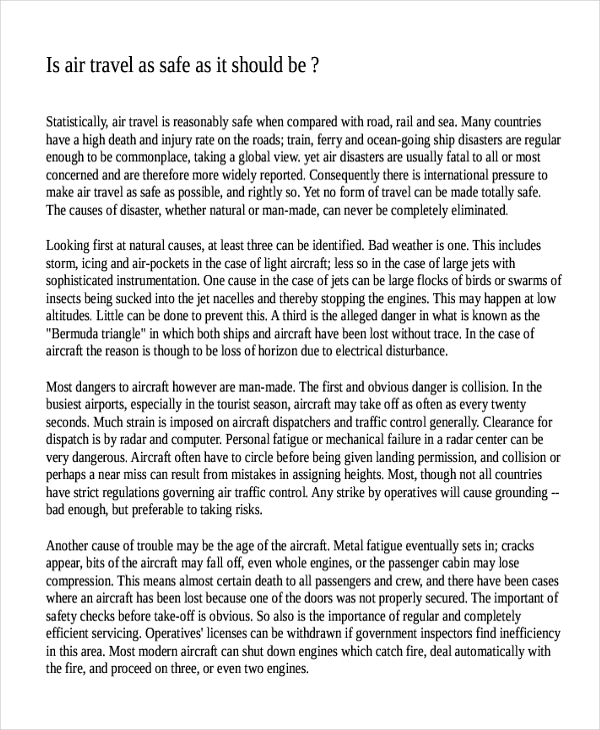
Reflective High School Essay
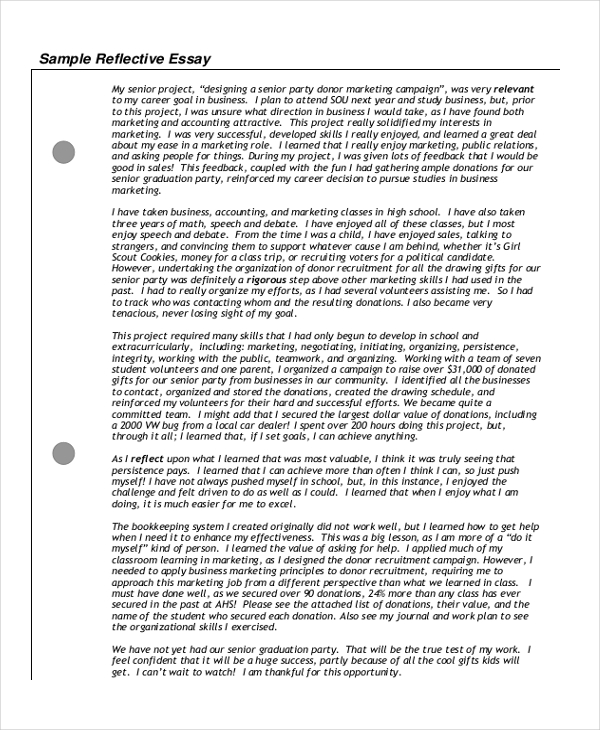
How to Write High School Essay?
Writing a high school essay involves clear structure, logical flow, and proper argumentation. Here’s a step-by-step guide:
Understand the Assignment
Read the prompt carefully and ensure you understand the topic. Identify the essay type (e.g., narrative, argumentative, persuasive).
Research and Gather Information
Use credible sources for research if needed. Take notes on key points to include in your essay.
Create an Outline
Introduction : Start with a hook, introduce your topic, and include a clear thesis statement. Body Paragraphs : Organize your main points logically. Each paragraph should focus on a single idea and include evidence or examples. Conclusion : Summarize your main points and restate the thesis without introducing new information.
Write the Essay
Introduction : Capture the reader’s attention with an interesting opening, and end with your thesis statement. Body Paragraphs : Begin each with a topic sentence, provide evidence or examples, and explain their relevance to your thesis. Conclusion : Reinforce your thesis and the main ideas from the body paragraphs.
Revise and Proofread
Check for grammatical errors, clarity, and coherence. Ensure your thesis is supported by your arguments.
Types of High School Essay
High school essays can be categorized into several types based on their purpose and structure. Here are the most common types:
1. Narrative Essay
- Purpose : To tell a story or recount an experience.
- Features : First-person point of view, descriptive details, and a clear sequence of events.
- Example : Writing about a memorable event in your life.
2. Descriptive Essay
- Purpose : To describe a person, place, thing, or event in detail.
- Features : Uses sensory details and vivid descriptions.
- Example : Describing a beautiful sunset or a significant object.
3. Expository Essay
- Purpose : To explain a concept or provide information about a topic.
- Features : Clear organization, facts, and logical explanations.
- Example : Explaining how photosynthesis works.
4. Persuasive (or Argumentative) Essay
- Purpose : To convince the reader of a particular viewpoint or argument.
- Features : Strong thesis, logical arguments, and evidence to support claims.
- Example : Arguing why school uniforms should be mandatory.
5. Compare and Contrast Essay
- Purpose : To highlight the similarities and differences between two or more subjects.
- Features : Uses comparison and contrast structure.
- Example : Comparing the educational systems of two countries.
6. Cause and Effect Essay
- Purpose : To analyze the causes of an event and its effects.
- Features : Discusses both causes and consequences in a logical order.
- Example : Exploring the causes and effects of climate change.
7. Analytical Essay
- Purpose : To analyze a text, event, or concept in depth.
- Features : Critical thinking, interpretation, and evaluation of ideas.
- Example : Analyzing the themes in a novel or play.
Importance of High School Essay
High school essays are important for several reasons that go beyond simply earning grades. Here are the key benefits:
1. Develops Critical Thinking
- Writing essays encourages students to analyze, evaluate, and synthesize information, sharpening their ability to think critically.
2. Improves Writing Skills
- Regular essay writing helps students enhance their grammar, vocabulary, and overall communication skills, which are essential for academic and professional success.
3. Enhances Research Abilities
- Essays often require gathering information from various sources, teaching students how to research effectively, verify facts, and cite sources properly.
4. Teaches Organization
- Structuring essays with an introduction, body paragraphs, and conclusion helps students develop a clear, logical flow in their arguments, which is critical in both academic and professional writing.
5. Prepares for Higher Education
- Essays are a key component of college applications and college-level assignments. High school essay practice prepares students for the more advanced writing tasks they will encounter in higher education.
6. Boosts Creativity
- Through descriptive and narrative essays, students can express their creativity and explore different ways of presenting ideas and stories.
7. Builds Persuasion and Argumentation Skills
- Persuasive essays help students learn how to present strong, reasoned arguments and defend their viewpoints, a vital skill in debates, discussions, and everyday life.
8. Improves Time Management
- Writing essays requires planning, outlining, drafting, and revising, helping students develop time management skills as they work within deadlines.
Tips for High School Essay
Here are some key tips for writing a high school essay:
- Understand the prompt : Read the assignment carefully to know exactly what’s expected.
- Plan before writing : Outline your main ideas and structure.
- Create a strong thesis statement : Clearly state your main argument or point.
- Use clear topic sentences : Begin each paragraph with a clear topic sentence that supports the thesis.
- Provide evidence : Use facts, examples, and quotes to support your arguments.
- Stay organized : Ensure each paragraph flows logically to the next.
- Revise and proofread : Check for grammar, spelling, and clarity issues.
- Write a compelling conclusion : Summarize key points and reinforce your thesis without introducing new information.
What makes a good high school essay?
A good high school essay features a clear thesis, coherent structure, compelling evidence, and personal insights, all presented in a polished, grammatically correct format.
How long should high school essay be?
The length varies based on the assignment, but high school essays are generally between 500–1,000 words.
How many paragraphs should a high school essay have?
Most high school essays have 5 paragraphs: one introduction, three body paragraphs, and one conclusion. However, this can vary depending on the assignment.
What tone should I use in a high school essay?
Maintain a formal, academic tone. Avoid slang, casual language, and overly complex or overly simple sentences.
What should be included in a high school essay?
A typical essay includes: An introduction with a thesis statement Body paragraphs with supporting evidence A conclusion that summarizes the main points
Text prompt
- Instructive
- Professional
Write a High School Essay on the importance of participating in sports.
Discuss the role of student government in high schools in a High School Essay.
What are your chances of acceptance?
Calculate for all schools, your chance of acceptance.
Your chancing factors
Extracurriculars.

50 Engaging Narrative Essay Topics for High Schoolers
Do you know how to improve your profile for college applications.
See how your profile ranks among thousands of other students using CollegeVine. Calculate your chances at your dream schools and learn what areas you need to improve right now — it only takes 3 minutes and it's 100% free.
Show me what areas I need to improve
What’s Covered:
Narrative essays vs. analytical essays, how to pick the right narrative essay topic, elements of a strong narrative essay, engaging narrative essay topics for high schoolers, where to get your narrative essay edited for free.
Narrative essays are an extensive form of writing that gives readers the opportunity to follow along as a person goes through a journey or sets of experiences. Rather than providing analytic insight, narrative essays simply share a story and offer a first-person account. These essays may seem easy to write at first, but it takes a certain finesse to write a narrative essay that is interesting, cohesive, and well-researched. Whether you’re looking for a unique topic to write about, or just want some new inspiration, CollegeVine is here to help! These 50 narrative essay topics are engaging, unique and will have you writing in no time.
A narrative essay is a great way to express your personal experiences and opinions, but it is important to remember that this type of essay is different from an analytical paper. In a narrative essay, you do not need to provide background information or explain your thoughts and feelings; instead, you simply tell a story. It’s important to avoid too much telling in your writing; instead, use creative details and vivid imagery to make readers feel as if they are actually right there with you.
Where You Will Encounter Narrative Essays
This type of essay is typically encountered in high school, where students may be required to write personal statements to prepare for their Common App essay . Narrative essays are also commonly seen in AP Language and Composition. Therefore, it’s important you are aware of the style because you are bound to have a narrative essay assignment.
Of course, before you start writing, it is important to pick the right essay topic. There are many factors involved in the process of picking the perfect narrative essay topic for your story.
You should always choose a topic that you are passionate about, since writing on something you care about will make the process much easier. Not only will it be more interesting to create your paper around something that truly interests you, but it will also allow you to fully express yourself in your essay. You also want to be sure that the topic has enough material to work with. If your chosen topic is too short, you will not have enough content to write a complete paper. For example, if you are writing about your experience getting lost at the mall, make sure that you have enough information to work with to craft an engaging narrative.
The best topic for an engaging narrative essay is one that focuses on showing versus telling, has a clear structure, and provides a dialogue. These elements come together to form an engaging narrative essay. Regardless of what subject you pick, any topic may be turned into a fascinating, A+ worthy narrative using the tips below.
Show, Don’t Tell
To write a good narrative essay, it’s important to show, not tell. Instead of simply informing your audience, show them what you mean. For example, instead of saying “I was nervous,” you could say “My heart began to race and my stomach filled with butterflies.” Also make sure to use sensory details, such as sights, sounds and tastes, and include a personal reflection at the end of your narrative.
Begin with a Strong Opening Line
A good narrative essay will begin with an attention-grabbing opening line. But make sure to avoid common clichés, such as “It was the best of times, it was the worst of times.” Instead, come up with something original and specific to you and your situation. For example: “My pre-calc teacher was obsessed with circles. I mean, he even used circular note cards.” Or, “It all started the day my mom brought home a guinea pig.”
Follows a Three-Act Structure
A strong narrative essay follows the same three-act structure as other essays. But in order to make it interesting, you’ll need to come up with a creative way to break things down into sections. For example, using the guinea pig example from above, you could write the following:
- Act 1 – Introduction: The day my mom brought home a guinea pig.
- Act 2 – Conflict: The day I had to say goodbye to my beloved pet.
- Act 3 – Conclusion: Looking back at how much I miss him now that he’s gone.
Conclude with Personal Reflection
To conclude your narrative essay, you’ll want to explain what this specific experience taught you or how you’ve changed. For example, upon realizing that her pre-calc teacher was obsessed with circles, the writer of the previous example begins to notice circular shapes everywhere. Another way to conclude your narrative essay is by touching on how this experience impacted you emotionally. For example, after losing his guinea pig, the writer explains how much he missed it.
Use Dialogue
Include a conversation in your essay to make it come alive. For example, instead of simply saying that you met a new friend, talk about how you introduced yourselves or what they were wearing when you met them.

Discover your chances at hundreds of schools
Our free chancing engine takes into account your history, background, test scores, and extracurricular activities to show you your real chances of admission—and how to improve them.
The following list of 50 narrative essay topics is divided into categories. This will make it easier to find a topic that fits your writing style.
1. What is a childhood song that still sticks with you today?
2. Your first day of Kindergarten
3. Talk about a time when you’re siblings looked up to you
4. Describe the best birthday party you’ve ever had
5. Talk about the best day you ever spent with a childhood friend
6. Explain your first childhood hobby
7. Describe your first halloween costume
8. A family vacation gone wrong
9. Your first family reunion
10. Describe a tradition that is unique to your family
11. Describe your family to a person who’s never met them before
12. What frustrates you most about your family
13. If you could only keep one memory of your family, what would it be and why?
14. Describe a time your family embarrassed you in public
15. The most beautiful place in the world
16. Your favorite season and why
17. If you were a part of nature, what element would you be? Why?
18. When you go outside, which of your senses are you most thankful to have?
19. Describe the first time you witnessed a tornado
20. Write a poem about your favorite season
21. Describe yourself as one of the four seasons
22. Describe a time in which you felt connected with nature
23. Describe the first time you played an instrument and how you felt
24. What major event would be much worse if music was removed, and why?
25. If you could only listen to one song for the rest of your life, what would it be and why?
26. What would a life without music look like?
27. If you could master one instrument, what would it be and why?
Relationships
28. What if you had never met your best friend?
29. Describe a time when you fixed a broken relationship
30. Talk about a movie that defined a relationship for you
31. Describe your first date
32. Describe the first time you made a friend
33. Describe your relationship with your parents
Self Reflection
34. Have you ever fooled someone? If so, describe what happened and how you felt about it
35. What is the worst thing you’ve done to someone else?
36. Write about the difference between how things seem and how they really are.
37. Have you ever been embarrassed in some way? If so, describe the situation and how it affected you as well as those around you
38. Have you ever witnessed something really beautiful? Describe it
39. Is your glass half empty or half full?
Overcoming Adversity
40. Have you ever been very afraid of something but tried your hardest to appear fearless? If so, describe that experience
41. When have you ever succeeded when you thought you might fail
42. What are your secret survival strategies?
43. Describe the last time you were stressed and why?
44. Describe a time when you were discriminated against
45. The most memorable class you’ve had and why
46. Your favorite study abroad memory
47. Describe your kindergarten classroom
48. Describe your first teacher
49. The first time you experienced detention
50. Your first field trip
Hopefully these topics will get you thinking about a personal experience that could make for a thoughtful and engaging narrative essay. Remember, a strong narrative essay must contain relatable details and a clear flow that keeps the reader entertained and engaged to read all the way to the end.
If you need some additional guidance on your narrative essay, use CollegeVine’s free peer review essay tool to get feedback for free!
Related CollegeVine Blog Posts

Home — Essay Samples — Education — Educational System — High School
Essays on High School
Welcome to our collection of high school essay samples! If you're a student looking for inspiration or guidance on how to write your own essay, you’re in the right place. Writing essays can sometimes feel overwhelming, but with the right examples and tips, you can create something truly great. In this section, we will explore various topics related to high school life and provide you with insights on how to select the best sample for your needs.
Understanding High School Essay Topics
High school essays can cover a wide range of subjects. From personal experiences to analytical pieces about literature or history, there’s plenty of ground to cover. When choosing an essay topic, think about what interests you most. Is it a memorable experience from your time in high school? Or perhaps you want to discuss the impact of social media on student life? Whatever it is, make sure it resonates with you.
Selecting the Right Essay Sample
Now that you've got some ideas swirling around in your head, let’s talk about how to pick an essay sample that suits your needs. First off, take a look at our categorized examples based on different themes like “Friendship,” “Challenges,” or “Future Aspirations.” Browse through them and see which one catches your eye.
When reviewing these samples, consider the following:
- Relevance: Make sure the topic aligns with what you need for your assignment.
- Style: Check if the writing style matches yours; this will help maintain consistency in your voice.
- Your Experience: Choose an example that relates closely to something you've experienced personally—this makes writing easier!
Writing Your Own High School Essay
You’ve picked out an essay sample—great! Now it's time for you to write yours using it as a guide. Start by outlining your thoughts based on what you've learned from our example. Identify key points that stood out and jot down any ideas that relate back to those points.
Your introduction should grab attention while briefly stating what you'll discuss in your essay. Use personal anecdotes where applicable; they add authenticity and make readers connect better with what you're saying.
The Importance of Drafting
No one writes a perfect essay on their first try! Don’t hesitate to draft multiple versions until you're satisfied with how everything flows together. After completing each version, step away for a bit before revisiting it—you'll be surprised at what new perspectives come up after taking a break!
Edit and Revise
This part is crucial! Go through grammar checks and ensure clarity throughout your piece. Read aloud if possible; hearing words can often highlight awkward phrases or unclear sentences better than reading silently would.
A Final Thought
Your high school years are filled with unique experiences just waiting to be shared through writing! By utilizing our collection of high school essay samples as stepping stones along this journey toward crafting excellent essays yourself—you’re bound not only improve academically but also uncover more about yourself along the way!
If you're still feeling unsure about where exactly to start after browsing through examples don’t worry—it's all part of learning! Dive into those drafts fearlessly because each word brings growth towards becoming skilled writers ready tackle any assignment ahead!
What High School Taught Me
About struggling in school: my expirience, made-to-order essay as fast as you need it.
Each essay is customized to cater to your unique preferences
+ experts online
The Importance of Higher Education in Our Life
Exploring student perspectives on education, importance of internet for today’s high school and college classes, my high school graduation speech, let us write you an essay from scratch.
- 450+ experts on 30 subjects ready to help
- Custom essay delivered in as few as 3 hours
High School Graduates Should Take a Year Off before Entering College – Student Gap Years
An excursion to high school, procrastination self efficacy and exam anxiety among high school students, the problem of students’ dropping out of high school to take a job, get a personalized essay in under 3 hours.
Expert-written essays crafted with your exact needs in mind
Financial Stress and Its Impact of Grade 11 Senior High School Students
High school education review, a quest for excellence by arcadia high school, the beginning of my nightmare: first day of high school, fools are found in schools, structure of the graduate record examination, the feeling of being outcast, why should school start later: negative effects of early school start, the effects of too much homework on children, arguments about why school uniforms should be required, do schools do enough to prevent bullying, transition from high school to university: literature review, the result of the road not taken, an argument in favor of moving the start time for high school students, career planning for high school or college student, review of the film the breakfast club, cosmetology programs in high schools, the issue of cosmetology high school programs, discussion: should school be year round, completely virtual high school: my experience.
A high school is a secondary school, where teenagers are educated before starting college or getting jobs. Most high schools have four numbered grades, from ninth to twelfth.
Relevant topics
- Middle School
- Stem Education
- Academic Interests
- College Experience
- Importance of Education
- Academic Challenges
- Academic Achievements
- Physical Education
- Studying Abroad
By clicking “Check Writers’ Offers”, you agree to our terms of service and privacy policy . We’ll occasionally send you promo and account related email
No need to pay just yet!
Bibliography
We use cookies to personalyze your web-site experience. By continuing we’ll assume you board with our cookie policy .
- Instructions Followed To The Letter
- Deadlines Met At Every Stage
- Unique And Plagiarism Free
- MEN Podcast
- Education Reform
- School Climate
- Student-Discipline
- Kindergarten
- Middle School
- High school
For Parents
- Family & Community
- School Choice
- School Safety
- Student Well Being
- Student Achievement
- Equity & Diversity
- Professional Dev.
- Recruitment & Retention
"We are always looking for stakeholders, If you would like to contribute,"

Latest Podcasts
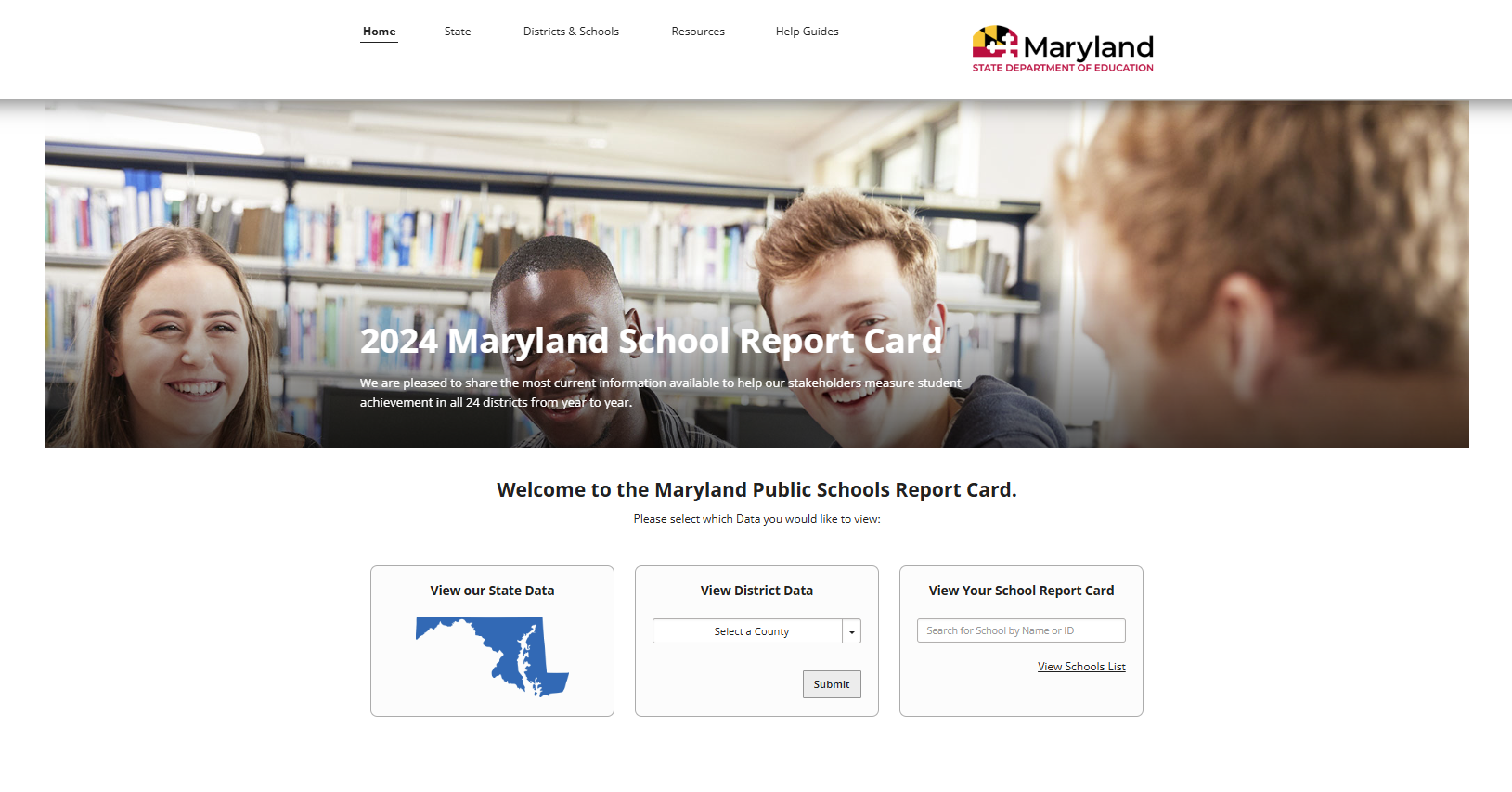
Star Ratings vs. Test Scores: What’s Really Happening ...

Cell Phones in Schools: The US Department of Education’s B...

Insight into the Worcester County Board of Education Distric...

Another Testing Overhaul by MSDE? Is MCAP On the Way Out?
- External Author (Not Written by MEN)
- Teaching>Classroom Ideas>High school
- April 21, 2024
The Big List of Essay Topics for High School (120+ Ideas!)
High school students generally do a lot of writing, learning to use language clearly, concisely, and persuasively. When it’s time to choose an essay topic, though, it’s easy to come up blank. If that’s the case, check out this huge round-up of essay topics for high school. You’ll find choices for every subject and writing style.
Argumentative Essay Topics for High School
When writing an argumentative essay, remember to do the research and lay out the facts clearly. Your goal is not necessarily to persuade someone to agree with you, but to encourage your reader to accept your point of view as valid. Here are some possible argumentative topics to try. ( Here are 100 more compelling argumentative essay topics. )
- The most important challenge our country is currently facing is … (e.g., immigration, gun control, economy)
- The government should provide free internet access for every citizen.
- All drugs should be legalized, regulated, and taxed.
- Vaping is less harmful than smoking tobacco.
- The best country in the world is …
- Parents should be punished for their minor children’s crimes.
- Should all students have the ability to attend college for free?
- Should physical education be part of the standard high school curriculum?
WeAreTeachers
- Schools should require recommended vaccines for all students, with very limited exceptions.
- Is it acceptable to use animals for experiments and research?
- Does social media do more harm than good?
- Capital punishment does/does not deter crime.
- What one class should all high schools students be required to take and pass in order to graduate?
- Do we really learn anything from history, or does it just repeat itself over and over?
- Are men and women treated equally?
Cause-and-Effect Essay Topics for High School
A cause-and-effect essay is a type of argumentative essay. Your goal is to show how one specific thing directly influences another specific thing. You’ll likely need to do some research to make your point. Here are some ideas for cause-and-effect essays. ( Get a big list of 100 cause-and-effect essay topics here. )
- Humans are causing accelerated climate change.
- Fast-food restaurants have made human health worse over the decades.
- What caused World War II? (Choose any conflict for this one.)
- Describe the effects social media has on young adults.
- How does playing sports affect people?
- What are the effects of loving to read?
- Being an only/oldest/youngest/middle child makes you …
- What effect does violence in movies or video games have on kids?
- Traveling to new places opens people’s minds to new ideas.
- Racism is caused by …
Compare-Contrast Essay Topics for High School
As the name indicates, in compare-and-contrast essays, writers show the similarities and differences between two things. They combine descriptive writing with analysis, making connections and showing dissimilarities. The following ideas work well for compare-contrast essays. ( Find 80+ compare-contrast essay topics for all ages here. )
- Public and private schools
- Capitalism vs. communism
- Monarchy or democracy
- Dogs vs. cats as pets
- Paper books or e-books
- Two political candidates in a current race
- Going to college vs. starting work full-time
- Working your way through college as you go or taking out student loans
- iPhone or Android
- Instagram vs. Twitter (or choose any other two social media platforms)
Descriptive Essay Topics for High School
Bring on the adjectives! Descriptive writing is all about creating a rich picture for the reader. Take readers on a journey to far-off places, help them understand an experience, or introduce them to a new person. Remember: Show, don’t tell. These topics make excellent descriptive essays.
- Who is the funniest person you know?
- What is your happiest memory?
- Tell about the most inspirational person in your life.
- Write about your favorite place.
- When you were little, what was your favorite thing to do?
- Choose a piece of art or music and explain how it makes you feel.
- What is your earliest memory?
- What’s the best/worst vacation you’ve ever taken?
- Describe your favorite pet.
- What is the most important item in the world to you?
- Give a tour of your bedroom (or another favorite room in your home).
- Describe yourself to someone who has never met you.
- Lay out your perfect day from start to finish.
- Explain what it’s like to move to a new town or start a new school.
- Tell what it would be like to live on the moon.
Expository and Informative Essay Topics for High School
Expository essays set out clear explanations of a particular topic. You might be defining a word or phrase or explaining how something works. Expository or informative essays are based on facts, and while you might explore different points of view, you won’t necessarily say which one is “better” or “right.” Remember: Expository essays educate the reader. Here are some expository and informative essay topics to explore. ( See 70+ expository and informative essay topics here. )
- What makes a good leader?
- Explain why a given school subject (math, history, science, etc.) is important for students to learn.
- What is the “glass ceiling” and how does it affect society?
- Describe how the internet changed the world.
- What does it mean to be a good teacher?
- Explain how we could colonize the moon or another planet.
- Discuss why mental health is just as important as physical health.
- Describe a healthy lifestyle for a teenager.
- Choose an American president and explain how their time in office affected the country.
- What does “financial responsibility” mean?
Humorous Essay Topics for High School
Humorous essays can take on any form, like narrative, persuasive, or expository. You might employ sarcasm or satire, or simply tell a story about a funny person or event. Even though these essay topics are lighthearted, they still take some skill to tackle well. Give these ideas a try.
- What would happen if cats (or any other animal) ruled the world?
- What do newborn babies wish their parents knew?
- Explain the best ways to be annoying on social media.
- Invent a wacky new sport, explain the rules, and describe a game or match.
- Imagine a discussion between two historic figures from very different times, like Cleopatra and Queen Elizabeth I.
- Retell a familiar story in tweets or other social media posts.
- Describe present-day Earth from an alien’s point of view.
- Choose a fictional character and explain why they should be the next president.
- Describe a day when kids are in charge of everything, at school and at home.
Literary Essay Topics
Literary essays analyze a piece of writing, like a book or a play. In high school, students usually write literary essays about the works they study in class. These literary essay topic ideas focus on books students often read in high school, but many of them can be tweaked to fit other works as well.
- Discuss the portrayal of women in Shakespeare’s Othello .
- Explore the symbolism used in The Scarlet Letter .
- Explain the importance of dreams in Of Mice and Men .
- Compare and contrast the romantic relationships in Pride and Prejudice .
- Dissect the allegory of Animal Farm and its relation to contemporary events.
- Interpret the author’s take on society and class structure in The Great Gatsby .
- Explore the relationship between Hamlet and Ophelia.
- Discuss whether Shakespeare’s portrayal of young love in Romeo and Juliet is accurate.
- Explain the imagery used in Beowulf .
Narrative and Personal Essay Topics for High School
Think of a narrative essay like telling a story. Use some of the same techniques that you would for a descriptive essay, but be sure you have a beginning, middle, and end. A narrative essay doesn’t necessarily need to be personal, but they often are. Take inspiration from these narrative and personal essay topics.
- Describe a performance or sporting event you took part in.
- Explain the process of cooking and eating your favorite meal.
- Write about meeting your best friend for the first time and how your relationship developed.
- Tell about learning to ride a bike or drive a car.
- Describe a time in your life when you’ve been scared.
- Share the most embarrassing thing that ever happened to you.
- Tell about a time when you overcame a big challenge.
- Tell the story of how you learned an important life lesson.
- Describe a time when you or someone you know experienced prejudice or oppression.
- Explain a family tradition, how it developed, and its importance today.
- What is your favorite holiday? How does your family celebrate it?
- Retell a familiar story from the point of view of a different character.
- Describe a time when you had to make a difficult decision.
- Tell about your proudest moment.
Persuasive Essay Topics for High School
Persuasive essays are similar to argumentative , but they rely less on facts and more on emotion to sway the reader. It’s important to know your audience, so you can anticipate any counterarguments they might make and try to overcome them. Try these topics to persuade someone to come around to your point of view. ( Discover 60 more intriguing persuasive essay topics here. )
- Is democracy the best form of government?
- Is capitalism the best form of economy?
- Students should/should not be able to use their phones during the school day.
- Should schools have dress codes?
- If I could change one school rule, it would be …
- Is year-round school a good idea?
Research Essay Topics
A research essay is a classic high school assignment. These papers require deep research into primary source documents, with lots of supporting facts and evidence that’s properly cited. Research essays can be in any of the styles shown above. Here are some possible topics, across a variety of subjects.
- Which country’s style of government is best for the people who live there?
- Choose a country and analyze its development from founding to present day.
- Describe the causes and effects of a specific war.
- Formulate an ideal economic plan for our country.
- What scientific discovery has had the biggest impact on life today?
- Analyze the way mental health is viewed and treated in this country.
- Explore the ways systemic racism impacts people in all walks of life.
- Defend the importance of teaching music and the arts in public schools.
- Choose one animal from the endangered species list, and propose a realistic plan to protect it.
What are some of your favorite essay topics for high school? Come share your prompts on the WeAreTeachers HELPLINE group on Facebook .
Plus, check out the ultimate guide to student writing contests , dig deeper with our longreads, newsletter sign up to get our best longform features, investigations, and thought-provoking essays, in your inbox every sunday..
The MEN was founded by John Huber in the fall of 2020. It was founded to provide a platform for expert opinion and commentary on current issues that directly or indirectly affect education. All opinions are valued and accepted providing they are expressed in a professional manner. The Maryland Education Network consists of Blogs, Videos, and other interaction among the K-12 community.
Recent Video
Star ratings vs. test scores: what’s really happening in maryland schools, recent articles.

Too Much Government, Too Little Reality: The Blueprint’s Empty Promises Are Catching Up
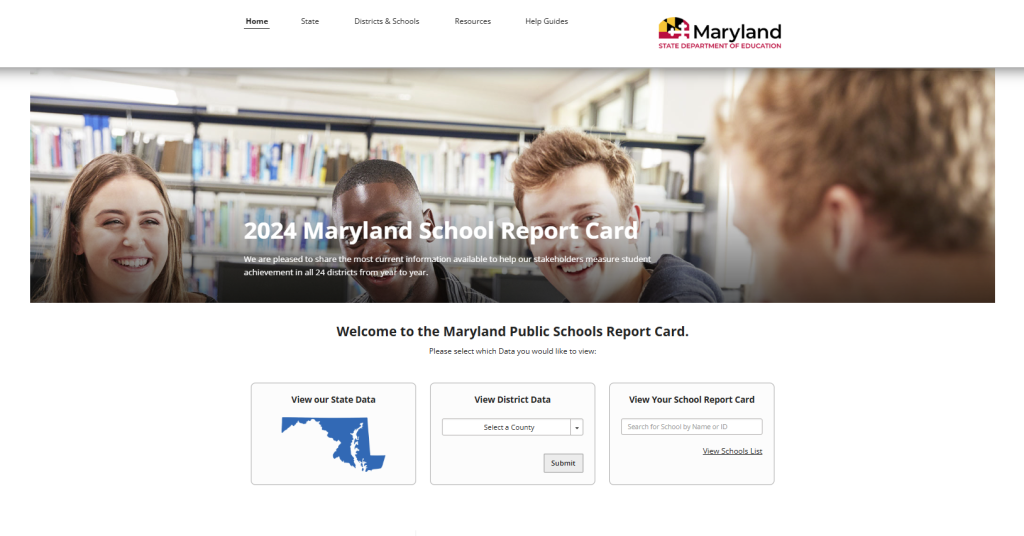
Cell Phones in Schools: The US Department of Education’s Big Ask and Bigger Questions

Are Maryland’s Star Ratings Misleading Parents About School Performance?
Federal guidance on cell phones in schools: policy fix or more problems.
How Two Teachers Are Supporting Teens’ Mental Health Right Now
23 scream-worthy horror books for teens to read right now.
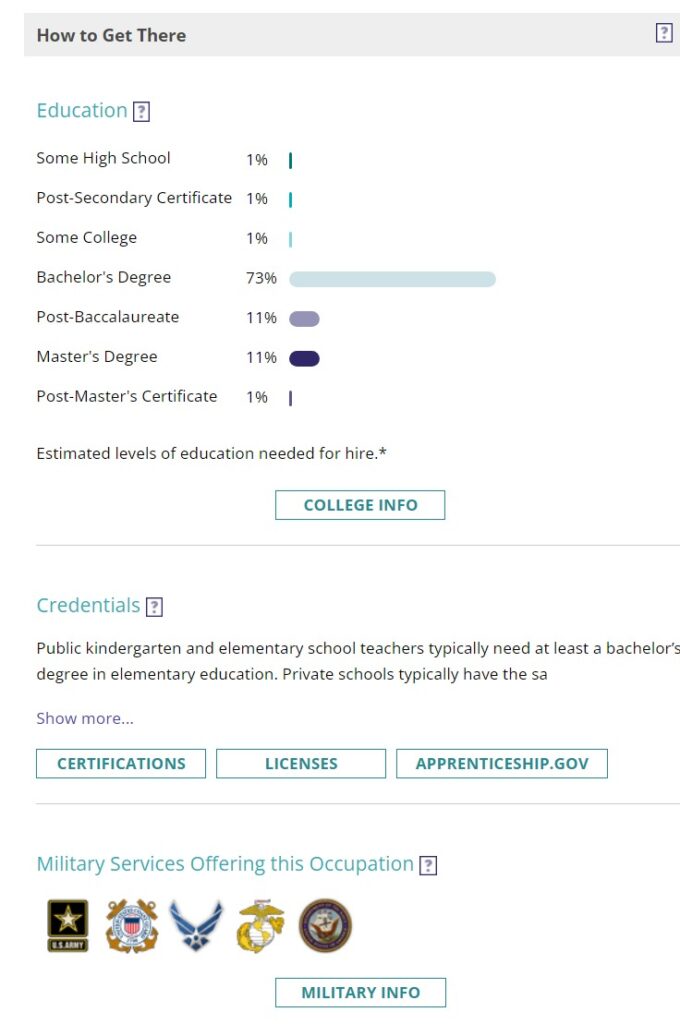
What Is Career Planning for High School Students?
Teacher pensions are failing educators most states get d and f grades, get maryland educaction network updates to your inbox.
Maryland Education Network provides information and expert opinion on current issues regarding education in our Maryland Public Schools and other education issue of a national interest.
- Privacy Policy
- Terms & Conditions
Copyright 2024 © Maryland Education Network

IMAGES
COMMENTS
Dec 4, 2016 · Below are some essays students can read, not only to help them see how such writing is done in the real world, but also to learn more about the world around them. [bctt tweet=”Need a #mentortext for student essays? Check out these exemplars for personal narrative, argumentative, and expository essay writing.”] Note: This is a living list. I ...
Dec 14, 2022 · Essay Topics for High School Students to Practice Writing Personal Essays-— Plus, 15 NEW bonus essay ideas and 11 personal writing ideas for writers of all ages. Yes, it’s true. Our personal essay topics for High School students may be used by high schoolers AND by college students, young adults, or writers of any age.
Jan 7, 2020 · Update: Join our live webinar on Oct. 8 about teaching with our Narrative Writing Contest. In September, we challenged teenagers to write short, powerful stories about meaningful life experiences ...
Oct 25, 2024 · High school students generally do a lot of writing, learning to use language clearly, concisely, and persuasively. When it’s time to choose an essay topic, though, it’s easy to come up blank. If that’s the case, check out this huge roundup of essay topics for high school. You’ll find choices for every subject and writing style. Jump to:
Oct 24, 2024 · Importance of High School Essay. High school essays are important for several reasons that go beyond simply earning grades. Here are the key benefits: 1. Develops Critical Thinking. Writing essays encourages students to analyze, evaluate, and synthesize information, sharpening their ability to think critically. 2. Improves Writing Skills
Sep 23, 2024 · Explore over 150 personal essay topics to inspire high school and college students. Write engaging personal narratives with these fresh, thought-provoking prompts.
Feb 5, 2024 · Students start writing personal narratives at a young age, learning to use descriptive language to tell a story about their own experiences. Try sharing these personal narrative examples for elementary, middle, and high school to help them understand this essay form. What is a personal narrative? Think of a narrative essay like telling a story.
Oct 15, 2021 · These 50 narrative essay topics are engaging, unique and will have you writing in no time. Narrative Essays vs. Analytical Essays A narrative essay is a great way to express your personal experiences and opinions, but it is important to remember that this type of essay is different from an analytical paper. In a narrative essay, you do not need ...
Understanding High School Essay Topics. High school essays can cover a wide range of subjects. From personal experiences to analytical pieces about literature or history, there’s plenty of ground to cover. When choosing an essay topic, think about what interests you most. Is it a memorable experience from your time in high school?
Apr 21, 2024 · High school students generally do a lot of writing, learning to use language clearly, concisely, and persuasively. When it’s time to choose an essay topic, though, it’s easy to come up blank. If that’s the case, check out this huge round-up of essay topics for high school. You’ll find choices for every subject and writing style.